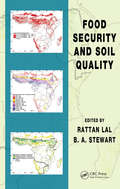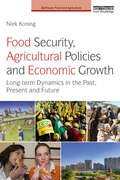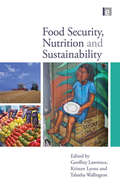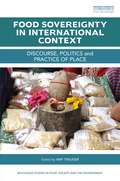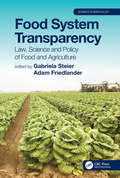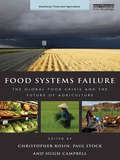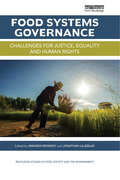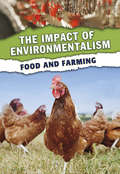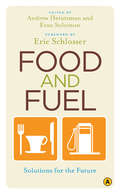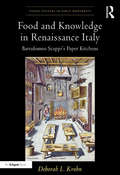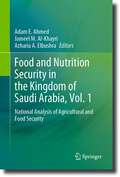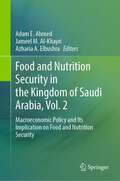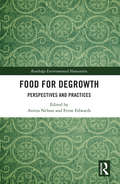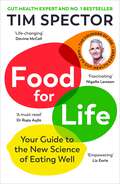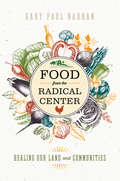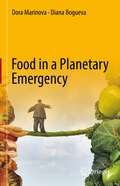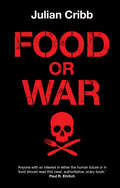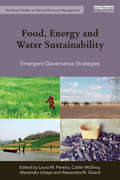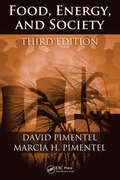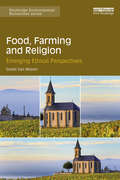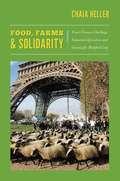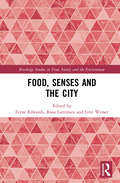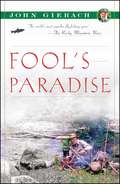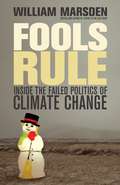- Table View
- List View
Food Security and Soil Quality (Advances in Soil Science)
by Paul C. H. LiJust five years ago, it was generally believed that the number of food insecure people in the world was on continuous decline. Unfortunately, widespread soil degradation along with resistance to recommended agronomic practices, and little attempt to restore degraded soils have conspired with significant droughts (in regions that could least tolerat
Food Security, Agricultural Policies and Economic Growth: Long-term Dynamics in the Past, Present and Future (Earthscan Food and Agriculture)
by Niek KoningUsing a political-economic approach supplemented with insights from human ecology, this volume analyzes the long-term dynamics of food security and economic growth. The book begins by discussing the nature of preindustrial food crises and the changes that have occurred since the 19th century with the ascent of technical science and the fossil fuel revolution. It explains how these changes improved living standards but that the realization of this improvement was usually dependent on government support for smallholder modernization. The author sets out how the evolution of food security in different regions has been influenced by farm policy choices and how these choices were shaped by local societal characteristics, international relations and changing configurations in metropolitan countries. Separate chapters are devoted to the interaction of this evolution with debates on food security and economic growth and with international economic policies. The final chapters highlight the new challenges for global food security that will arise as traditional sources of biomass production and the more easily extractable reserves of fossil biomass become depleted or can no longer be used. Overall, the book emphasizes the inadequacy of current explanations with regard to these challenges. It explores what is needed to ensure a sustainable future and calls for a rethinking of these issues; a necessary reflection in today's unstable global political situation.
Food Security, Nutrition and Sustainability
by Geoffrey Lawrence Kristen Lyons Tabatha WallingtonAs the threats of food insecurity loom ever larger, the world faces the sad irony of food shortages in the global South alongside a purported 'obesity epidemic' in the global North. The twin issues of food production and food access are of particular concern in the context of climate change, 'peak oil', biofuels, and land grabs by wealthy nations. Food Security, Nutrition and Sustainability offers critical insights by international scholars, with chapters on global food security, supermarket power, new technologies, and sustainability. The book also assesses the contributions of diet and nutrition research in building socially just and environmentally sustainable food systems and provides policy recommendations to improve the health and environmental status of contemporary agri-food systems. The book features contributions from a range of social science perspectives, including sociology, anthropology, public health and geography, with case study material drawn from throughout the world.
Food Sovereignty in International Context: Discourse, politics and practice of place (Routledge Studies in Food, Society and the Environment)
by Amy TraugerFood sovereignty is an emerging discourse of empowerment and autonomy in the food system with the development of associated practices in rural and some urban spaces. While literature on food sovereignty has proliferated since the first usage of the term in 1996 at the Rome Food Summit, most has been descriptive rather than explanatory in nature, and often confuses food sovereignty with other movements and objectives such as alternative food networks, food justice, or food self-sufficiency. This book is a collection of empirically rich and theoretically engaged papers across a broad geographical spectrum reflecting on what constitutes the politics and practices of food sovereignty. They contribute to a theoretical gap in the food sovereignty literature as well as a relative shortage of empirical work on food sovereignty in the global "North", much previous work having focussed on Latin America. Specific case studies are included from Canada, Norway, Switzerland, southern Europe, UK and USA, as well as Africa, India and Ecuador. The book presents new research on the emergence of food sovereignties. It offers a wide variety of empirical examples and a theoretically engaged framework for explaining the aims of actors and organizations working toward autonomy and democracy in the food system.
Food System Transparency: Law, Science and Policy of Food and Agriculture (Advances in Agroecology)
by Gabriela Steier Adam FriedlanderThis book brings together an international group of agriculture and food lawyers and scientists to define the field of Food System Transparency in three parts: the big picture, food safety and health, and the global view. Each part adds to the whole but zooms in through a unique lens. Investigating social, economic, political, scientific and legal frameworks, this comprehensive volume addresses topics such as food authenticity, agroecological evaluations, and consumer protection. Interwoven themes of transparency contextualize concepts of food safety, information sharing and regulatory opportunities at a local and global scale. Editors’ notes provide blended legal and scientific commentary to facilitate further discussion and context within the classroom. Advantages of this volume include: Chapters written by foremost international experts in their fields Editors’ notes written for classroom use and background information Figures and tables providing illustrations of important concepts Case studies delivering practicality and in-depth analysis to current events A special chapter on COVID-19 and its implications for the food system This book is important reading for graduate-level students, legal scholars, nonlegal academics, advocates for food system transparency and resilience, agroecology and environmental conservation, and practitioners in any cross-disciplinary areas relating to food policy. It will be of interest to all those who seek to deepen their understanding of the concepts and trends surrounding the information that centers around our food system, both domestically in the United States and the European Union, as well as in many major trading nations such as China.Check out the Support Materials tab on www.routledge.com/9780367440367 for a short video previewing some the key themes in the book.
Food Systems Failure: The Global Food Crisis and the Future of Agriculture (Earthscan Food and Agriculture)
by Hugh Campbell Paul Stock Christopher RosinThis book provides a critical assessment of the contemporary global food system in light of the heightening food crisis, as evidence of its failure to achieve food security for the world's population. A key aspect of this failure is identified in the neoliberal strategies which emphasize industrial efficiencies, commodity production and free trade-ideologies that underlie agricultural and food policies in what are frequently referred to as 'developed countries'. The book examines both the contradictions in the global food system as well as the implications of existing ideologies of production associated with commodity industrial agriculture using evidence from relevant international case studies. The book's first section presents the context of the food crisis with contributions from leading international academics and food policy activists, including climate scientists, ecologists and social scientists. These contributions identify current contradictions in policy and practice that impede solutions to the food crisis. Set within this context, the second section assesses current conditions in the global food system, including economic viability, sustainability and productivity. Case study analyses of regions exposed to neoliberal policy at the production end of the system provide insights into both current challenges to feeding the world, as well as alternative strategies for creating a more just and moral food system.
Food Systems Governance: Challenges for justice, equality and human rights (Routledge Studies in Food, Society and the Environment)
by Jonathan Liljeblad Amanda KennedySustainability and food production represent a major challenge to society, with both consumption and supply sides posing practical and ethical dilemmas. This book shows that food governance issues can occur in many ways and at many points along the food chain. The risks and impacts, particularly with the increasing globalisation of food systems, are often distributed in unequal ways. It is the role of law to form the pivot around which these issues are addressed in society in the form of food governance mechanisms. The chapters in this book address a range of issues in food governance revolving around questions of justice, fairness, equality and human rights. They identify different issues regarding inequality in access and control over food governance. Some address generic governance and institutional issues across a range of international contexts, while others present case studies, including from Argentina, China, India, Indonesia, Thailand, UK and West Africa. The book offers directions for reform of the law and legal institutions to mitigate the dangers of inequality and promote greater fairness in food governance.
Food and Farming (The Impact of Environmentalism)
by Jen GreenWe are all aware of the importance of the environment - it's in the news, it affects our behavior and the decisions we make every day. But what actual impact has environmental thinking had on the world around us? This thought-provoking book looks at the way changing ideas about the environment and sustainability have affected the way we obtain our food, and will do so in the future.
Food and Fuel: Solutions for the Future
by Evan Solomon Andrew HeintzmanThe twenty-first century has been dominated by two major global crises: a scarcity of food and fuel. Both have had detrimental effects on the environment and both are at the root of the fragile health of the global economy. Combining the best of the critically acclaimed Fuelling the Future and Feeding the Future, this timely and provocative collection of essays from leading thinkers such as Thomas Homer-Dixon, Gordon Laird, Jeremy Rifkin, Frances Moore Lappe, and Anna Lappe offers valuable strategies to combat global famine and fast-food fat; business models for sustainable food production and power sources; and descriptions of emerging technologies and sciences.
Food and Knowledge in Renaissance Italy: Bartolomeo Scappi's Paper Kitchens (Visual Culture In Early Modernity Ser.)
by Deborah L KrohnThough Bartolomeo Scappi's Opera (1570), the first illustrated cookbook, is well known to historians of food, up to now there has been no study of its illustrations, unique in printed books through the early seventeenth century. In Food and Knowledge in Renaissance Italy, Krohn both treats the illustrations in Scappi's cookbook as visual evidence for a lost material reality; and through the illustrations, including several newly-discovered hand-colored examples, connects Scappi's Opera with other types of late Renaissance illustrated books. What emerges from both of these approaches is a new way of thinking about the place of cookbooks in the history of knowledge. Krohn argues that with the increasing professionalization of many skills and trades, Scappi was at the vanguard of a new way of looking not just at the kitchen-as workshop or laboratory-but at the ways in which artisanal knowledge was visualized and disseminated by a range of craftsmen, from engineers to architects. The recipes in Scappi's Opera belong on the one hand to a genre of cookery books, household manuals, and courtesy books that was well established by the middle of the sixteenth century, but the illustrations suggest connections to an entirely different and emergent world of knowledge. It is through study of the illustrations that these connections are discerned, explained, and interpreted. As one of the most important cookbooks for early modern Europe, the time is ripe for a focused study of Scappi's Opera in the various contexts in which Krohn frames it: book history, antiquarianism, and visual studies.
Food and Nutrition Security in the Kingdom of Saudi Arabia, Vol. 1: National Analysis of Agricultural and Food Security
by Jameel M. Al-Khayri Adam E. Ahmed Azharia A. ElbushraFood and nutrition security is a major concern for Saudi Arabia and the surrounding regions due to the range of challenges they face. These challenges include limited agricultural resources, low self-sufficiency in key food staples, climate change, and high levels of food loss and waste. This book aims to evaluate and analyze the current situation and future prospects of food and nutrition security in Saudi Arabia. Additionally, it seeks to analyze and assess the roles and functions of various institutions related to food security, providing a deeper understanding of the complex problems associated with it. Furthermore, this book aligns with Kingdom Vision 2030, which includes a set of strategies and programs focused on agriculture, food, and water security. It also aligns with the institutional identity of King Faisal University's "Food Security and Environmental Sustainability".The book consists of four volumes. Volume 1, entitled "National Analysis of Agriculture and Food Security" aims to assess the current state of food security in Saudi Arabia, covering key aspects such as agriculture and food resources, food systems, crops, livestock, poultry, fisheries, animal health, food loss and waste, transportation and strategic reserve infrastructure, food security institutions, population, agricultural extension, climate change, agricultural mechanization, smart agriculture, and the utilization of solar energy.This book is highly significant for professionals, researchers, policymakers, and entrepreneurs involved in food and nutrition security in Saudi Arabia, the Gulf Cooperation Council, and various national and international organizations. It offers a comprehensive analysis of the obstacles and possibilities in ensuring food and nutrition security, as well as presenting practical approaches to address these issues. Additionally, graduate students studying in fields related to food and nutrition security will benefit from this book.
Food and Nutrition Security in the Kingdom of Saudi Arabia, Vol. 2: Macroeconomic Policy and Its Implication on Food and Nutrition Security
by Jameel M. Al-Khayri Adam E. Ahmed Azharia A. ElbushraFood and nutrition security is a major concern for Saudi Arabia and the surrounding regions due to the range of challenges they face. These challenges include limited agricultural resources, low self-sufficiency in key food staples, climate change, and high levels of food loss and waste. This book aims to evaluate and analyze the current situation and future prospects of food and nutrition security in Saudi Arabia. Additionally, it seeks to analyze and assess the roles and functions of various institutions related to food security, providing a deeper understanding of the complex problems associated with it. Furthermore, this book aligns with Kingdom Vision 2030, which includes a set of strategies and programs focused on agriculture, food, and water security. It also aligns with the institutional identity of King Faisal University's "Food Security and Environmental Sustainability".The book consists of four volumes. Volume 2 is entitled "Macroeconomic Policy Implications on Food and Nutrition Security". It covers various areas, including food price, loss and waste, processing, finance, trade, investment, quality and safety, consumption patterns, climate change, early warning systems, nutrition institutions, oil revenue, and the significance of date palm and Hassawi rice, genetically modified food, and edible insects in ensuring food and nutritional security.This book is highly significant for professionals, researchers, policymakers, and entrepreneurs involved in food and nutrition security in Saudi Arabia, the Gulf Cooperation Council, and various national and international organizations. It offers a comprehensive analysis of the obstacles and possibilities in ensuring food and nutrition security, as well as presenting practical approaches to address these issues. Additionally, graduate students studying in fields related to food and nutrition security will benefit from this book.
Food for Degrowth: Perspectives and Practices (Routledge Environmental Humanities)
by Anitra Nelson and Ferne EdwardsThis collection breaks new ground by investigating applications of degrowth in a range of geographic, practical and theoretical contexts along the food chain. Degrowth challenges growth and advocates for everyday practices that limit socio-metabolic energy and material flows within planetary constraints. As such, the editors intend to map possibilities for food for degrowth to become established as a field of studies. International contributors offer a range of examples and possibilities to develop more sustainable, localised, resilient and healthy food systems using degrowth principles of sufficiency, frugal abundance, security, autonomy and conviviality. Chapters are clustered in parts that critically examine food for degrowth in spheres of the household, collectives, networks, and narratives of broader activism and discourses. Themes include broadening and deepening concepts of care in food provisioning and social contexts; critically applying appropriate technologies; appreciating and integrating Indigenous perspectives; challenging notions of 'waste', 'circular economies' and commodification; and addressing the ever-present impacts of market logic framed by growth. This book will be of greatest interest to students and scholars of critical food studies, sustainability studies, urban political ecology, geography, environmental studies such as environmental sociology, anthropology, ethnography, ecological economics and urban design and planning.
Food for Life: The New Science of Eating Well, by the Sunday Times bestselling author of SPOON-FED
by Tim Spector'Life-changing' DAVINA McCALL'A must-read' Dr RUPY AUJLA'Fascinating' NIGELLA LAWSON'Empowering' LIZ EARLE**AS HEARD ON THE DIARY OF A CEO PODCAST**Food is our greatest ally for good health, but the question of what to eat in the age of ultra-processed food has never seemed so complicated.Drawing on cutting-edge research and personal insights, Professor Tim Spector offers clear answers in this definitive, easy-to-follow guide to the new science of eating well.Empowering and practical, Food for Life is nothing less than a new approach to how to eat - for our health and the health of the planet.‘No fads, no nonsense, just practical, science-based advice on how to eat well’ Daily Mail, Books of the Year'A rigorously academic book that welcomes the layperson with open arms' The Times** A THE TIMES and SUNDAY TIMES BOOK OF THE YEAR**** WINNER OF THE FORTNUM & MASON SPECIAL AWARD **
Food from the Radical Center: Healing Our Land and Communities
by Gary Paul Nabhan"Informational and inspirational."—BooklistAmerica has never felt more divided. But in the midst of all the acrimony comes one of the most promising movements in our country's history. People of all races, faiths, and political persuasions are coming together to restore America's natural wealth: its ability to produce healthy foods.In Food from the Radical Center, Gary Nabhan tells the stories of diverse communities who are getting their hands dirty and bringing back North America's unique fare: bison, sturgeon, camas lilies, ancient grains, turkeys, and more. These efforts have united people from the left and right, rural and urban, faith-based and science-based, in game-changing collaborations. Their successes are extraordinary by any measure, whether economic, ecological, or social. In fact, the restoration of land and rare species has provided—dollar for dollar—one of the best returns on investment of any conservation initiative.As a leading thinker and seasoned practitioner in biocultural conservation, Nabhan offers a truly unique perspective on the movement. He draws on fifty years of work with community-based projects around the nation, from the desert Southwest to the low country of the Southeast. Yet Nabhan's most enduring legacy may be his message of hope: a vision of a new environmentalism that is just and inclusive, allowing former adversaries to commune over delicious foods.
Food in a Planetary Emergency
by Dora Marinova Diana BoguevaThis book Food in a Planetary Emergency is a timely overview of the current food systems and the required transformations to respond to the challenges of climate change, population pressures, biodiversity loss and use of natural resources, such as soils, water and phosphorus. This book takes a planetary health perspective which explores the links between natural systems and human wellbeing implying that there is need for united actions to achieve important environmental and population health co-benefits.This book outlines that the foundation of planetary health is sustainability. It addresses environment and climate change emergency as a global agenda, however, emphasises the urgency of the sustainability perspective which integrates a wide spectrum of issues that require integrated solutions to offer better prospects for humanity. This book drives this argument further through the global Sustainable Development Goals (SDGs) where food is not just SDG2 but transcends all 17 goals.This book tackles the problems of food production and consumption at a global, industry and individual level linking it to topics related to the natural environment, climate change, waste, marketing, new ways of producing food and providing alternative proteins, mitigating non-communicable diseases, flexitarianism and the role of Generation Z in the emerging dietary choices.This book benefits readers with understanding the importance and intricacy of their dietary choices at a point in time when our planet is facing an emergency triggered by long-term dependence on fossil fuels and artificial fertilisers but also by the ways we have provided food. However, this book also delivers the message that safeguarding and sustaining planetary health is possible.
Food or War
by Julian CribbOurs is the Age of Food. Food is a central obsession in all cultures, nations, the media, and society. Our future supply of food is filled with risk, and history tells us that lack of food leads to war. But it also presents us with spectacular opportunities for fresh human creativity and technological prowess. Julian Cribb describes a new food system capable of meeting our global needs on this hot and overcrowded planet. This book is for anyone concerned about the health, safety, affordability, diversity, and sustainability of their food - and the peace of our planet. It is not just timely - its message is of the greatest urgency. Audiences include consumers, 'foodies', policymakers, researchers, cooks, chefs and farmers. Indeed, anyone who cares about their food, where it comes from and what it means for them, their children and grandchildren.
Food, Energy and Water Sustainability: Emergent Governance Strategies (Earthscan Studies in Natural Resource Management)
by Laura M. Pereira Caitlin A. McElroy Alexandra Littaye Alexandra M. GirardSocieties around the world face an increasingly uncertain future as social and ecological changes create pressure on resource governance, and this uncertainty calls for new models that illuminate the intersections of civil society, public sector, and private sector resource management. This volume presents a diversity of collaborations between various governance actors in the management of the Food-Energy-Water (FEW) nexus. It analyses the ability of emergent governance structures to cope with the complexity of future challenges across FEW systems. Divided into two sections, chapters in the first half of the book present a collection of case studies from around the world exemplifying how FEW nexus challenges are addressed in a multitude of ways and by a variety of actors. Chapters in the second half offer broader perspectives on the management of FEW and underline the lessons that emerge from applying a FEW lens to the question of natural resource governance. The varied examples in this book highlight that the management of FEW is often a question of reinventing, adapting, and building upon existing practices. Such practices are deeply embedded in unique socio-cultural, environmental, and political contexts as well as ‘hard’ infrastructures. Most of all, this edited volume seeks to communicate the wealth of ideas from committed individuals who continue to work to improve natural resource governance and our sustainable futures.
Food, Energy, and Society
by David Pimentel Marcia H. PimentelSince the publication of the first edition of Food, Energy, and Society, the world's natural resources have become even more diminished due to the rapid expansion of the global human population. We are faced with dwindling food supplies in certain geographic areas, increasing pressure on energy resources, and the imminent extinction of many
Food, Farming and Religion: Emerging Ethical Perspectives (Routledge Environmental Humanities)
by Gretel Van WierenAlthough the religious and ethical consideration of food and eating is not a new phenomenon, the debate about food and eating today is distinctly different from most of what has preceded it in the history of Western culture. Yet the field of environmental ethics, especially religious approaches to environmental ethics, has been slow to see food and agriculture as topics worthy of analysis. This book examines how religious traditions and communities in the United States and beyond are responding to critical environmental ethical issues posed by the global food system. In particular, it looks at the responses that have developed within Jewish, Christian, and Islamic traditions, and shows how they relate to arguments and approaches in the broader study of food and environmental ethics. It considers topics such as land degradation and restoration, genetically modified organisms and seed consolidation, animal welfare, water use, access, pollution, and climate, and weaves consideration of human wellbeing and justice throughout. In doing so, Gretel Van Wieren proposes a model for conceptualizing agricultural and food practices in sacred terms. This book will appeal to a wide and interdisciplinary audience including those interested in environment and sustainability, food studies, ethics, and religion.
Food, Farms, and Solidarity: French Farmers Challenge Industrial Agriculture and Genetically Modified Crops (New ecologies for the twenty-first century)
by Chaia HellerThe Confédération Paysanne, one of France's largest farmers' unions, has successfully fought against genetically modified organisms (GMOs), but unlike other allied movements, theirs has been led by producers rather than consumers. In Food, Farms, and Solidarity, Chaia Heller analyzes the group's complex strategies and campaigns, including a call for a Europe-wide ban on GM crops and hormone-treated beef, and a protest staged at a McDonald's. Her study of the Confédération Paysanne shows the challenges small farms face in a postindustrial agricultural world. Heller also reveals how the language the union uses to argue against GMOs encompasses more than the risks they pose; emphasizing solidarity has allowed farmers to focus on food as a cultural practice and align themselves with other workers. Heller's examination of the Confédération Paysanne's commitment to a vision of alter-globalization, the idea of substantive alternatives to neoliberal globalization, demonstrates how ecological and social justice can be restored in the world.
Food, Senses and the City (Routledge Studies in Food, Society and the Environment)
by Ferne Edwards Roos Gerritsen Grit WesserThis work explores diverse cultural understandings of food practices in cities through the senses, drawing on case studies in the Americas, Asia, Australia, and Europe. The volume includes the senses within the popular field of urban food studies to explore new understandings of how people live in cities and how we can understand cities through food. It reveals how the senses can provide unique insight into how the city and its dwellers are being reshaped and understood. Recognising cities as diverse and dynamic places, the book provides a wide range of case studies from food production to preparation and mediatisation through to consumption. These relationships are interrogated through themes of belonging and homemaking to discuss how food, memory, and materiality connect and disrupt past, present, and future imaginaries. As cities become larger, busier, and more crowded, this volume contributes to actual and potential ways that the senses can generate new understandings of how people live together in cities. This book will be of great interest to students and scholars of critical food studies, urban studies, and socio-cultural anthropology.
Fool's Paradise
by John Gierach Glen WolffIf John Gierach is living in a fool's paradise, then it's a paradise that his regular readers will recognize and new fans will delight in discovering. Laced with the inimitable blend of wit and wisdom that have made him fly-fishing's foremost scribe, Fool's Paradise chronicles the fishing life in all its glory (catching your biggest fish ever) and squalor (being stranded in a tent during a soaking rainstorm). In Gierach's world, both experiences are valuable, and both evoke humor and insight. Fishermen everywhere will understand Gierach's quest to discover and explore new waters (and then not to divulge the best locations to anyone), the unlikely appeal of winter fly-fishing ("the ice fishing shanty served the dual purpose of group therapy and the neighborhood tavern"), how impossible it is to predict the best fishing ("Everything that happens is entirely familiar, but I don't always see it coming"), or even the absurdity of the entire exercise ("day after day, you're casting a fly that doesn't look like anything to fish that aren't hungry and may not even be there"). Braving trips on small prop planes and down "Oh-My-God" roads alike, Gierach and his fishing buddies pursue bull trout in British Columbia, steelhead in the Rocky Mountains, and pike so fierce that a wise fisherman wears Kevlar gloves for the obligatory trophy photo. But as with any activity that depends on unspoiled wilderness, change is constant. Gierach sees this happening both in the landscape ("You never get to point at a meadow full of browsing mule deer and say, 'You know, all this was once condos.'") and at lodges that now require guests to sign liability waivers ("[I] had a brief vision of herds of lawyers coursing over the tundra in search of litigation"). Just the same, he is always awed by the experience of nature, or as he puts it: "You're on a lovely, remote wilderness river in the Alaskan backcountry. There are people who would make this trip and not even bring a fishing rod." Musing on the enduring appeal of fishing, Gierach theorizes, "We're so used to the fake and the packaged that encountering something real can amount to a borderline religious experience." Equal parts fishing lore, philosophy, and great fish stories, Fool's Paradise may not be a perfect substitute for actually being out on the water, but it's surely the next best thing.
Fools Rule: Inside the Failed Politics of Climate Change
by William MarsdenThis eloquent, rage-inciting polemic about the global failure to deal with climate change will appeal to readers of Tim Flannery, George Monbiot and Bill McKibben--and anyone concerned with the economic and environmental future of our planet.Kyoto, 1997. Montreal, 2005. Copenhagen, 2009. Cancun, 2010. In Fools Rule, Marsden illustrates how inefficient and short-sighted political negotiations have become despite mounting scientific evidence that immediate action is essential to curb the effects of climate change. International climate change summits are now widely monitored events, attended by state leaders and crowded with journalists; yet somehow they have never been less productive. Treaties and action plans are smothered by economic self-interest, diplomatic errors and every nation's hungry scramble for its share of the remaining atmospheric space. Marsden takes us from inside the bungled negotiations at Copenhagen to the melting glaciers and untapped oil reserves of the Arctic; he shows us the paralyzing effect oil and gas companies have on green legal initiatives in the United States, and therefore on any international climate change treaty; and, with wit and penetrating insight, he asks the toughest question--will we be able to change before it's too late?From the Hardcover edition.
Footbagging
by Larry Dane BrimnerIntroduces the various games played with a footbag, including instructions in basic moves and kicks, tips on strategy, and a guide to clubs and competitions.
